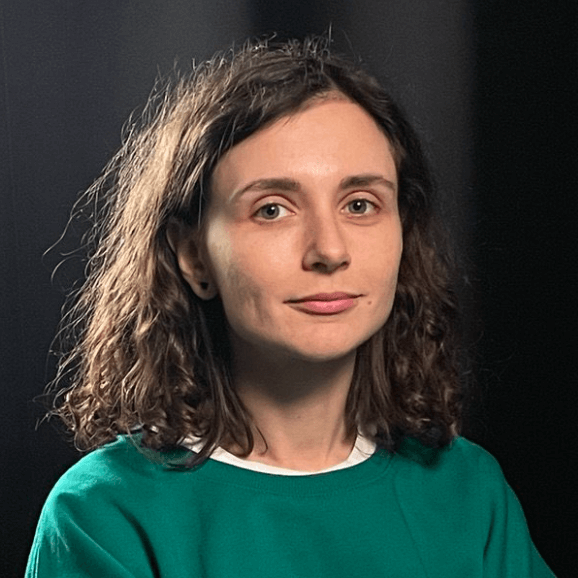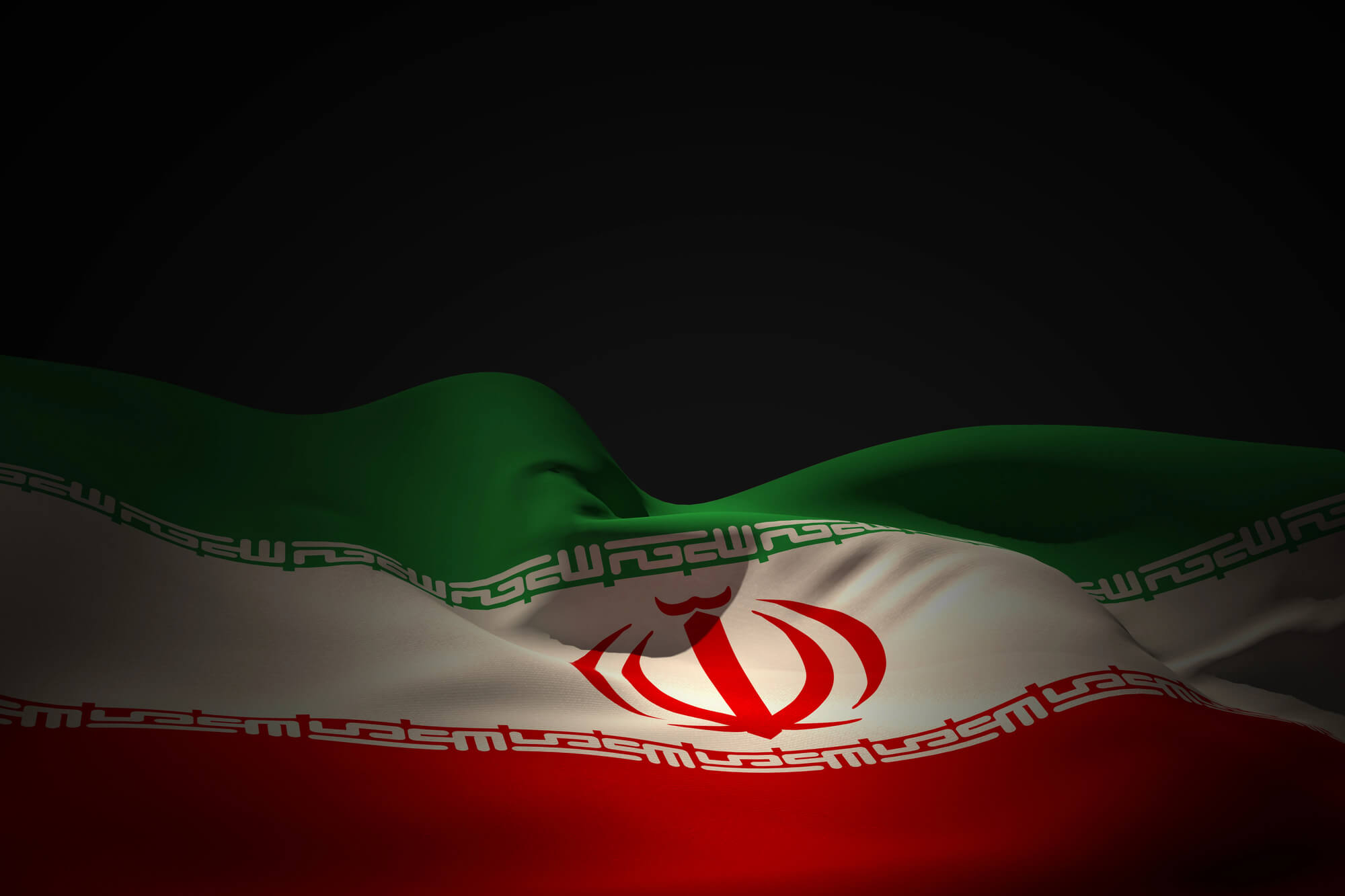During the open interview at the conference “EU. BUT THERE IS ONE TWIST,” Piotr Łukasiewicz, Chargé d’affaires of the Republic of Poland in Ukraine, shared Poland’s experience of European integration, spoke about the evolution of Polish-Ukrainian relations, and explained why Ukraine’s accession to the EU and NATO is a strategic interest for both Poland and the whole of Europe.
In an open conversation with Radio.NV journalist Oleh Biletskyi, Mr. Łukasiewicz spoke about the challenges of transformation, common security architecture, economic partnership, and the need to protect relations between our countries not only from missiles but also from disinformation.
We thank Anastasia Sosnova, Communications Manager at Vox Ukraine, for preparing this article based on Piotr Lukasiewicz’s speech.
The event was organized by Vox Ukraine with the support of the National Endowment for Democracy (NED) on May 23, 2025. Watch the conference recording here.
On Poland’s integration into NATO and the EU
Piotr Łukasiewicz noted that joining NATO was significantly easier for Poland than EU integration. While NATO primarily required transforming the military system, joining the EU implied a complete overhaul of the state and society.
“Integration into the European Union requires transformation of the whole state. I would even dare to say that it requires a transformation of the entire society on many levels. That’s why we joined NATO first in 1999 and joined the European Union in 2004. Compared to NATO, joining the EU required more time and effort.”
On why Ukraine’s membership in the EU and NATO is in Poland’s interest
Poland remains a consistent advocate for Ukraine’s Euro-Atlantic integration, not only out of solidarity, but also due to security and economic reasons:
“The full-scale invasion contributed to a deep strategic transformation of Ukrainian-Polish relations. This transformation leads us to believe that for security reasons, and due to economic and political interests, Ukraine should be in the European Union as our partner, and it should also be in NATO.”
“This is our strategic, political, and even historical and civilizational interest that Ukraine becomes a member of what was called the transatlantic family. We can discuss whether the transatlantic concept is still alive, but the idea of Ukraine being a part of this family of free, independent, democratic, militarily strong alliances — both the European Union and NATO — is very much alive in Poland. I can easily predict that this will remain our strategic goal.”
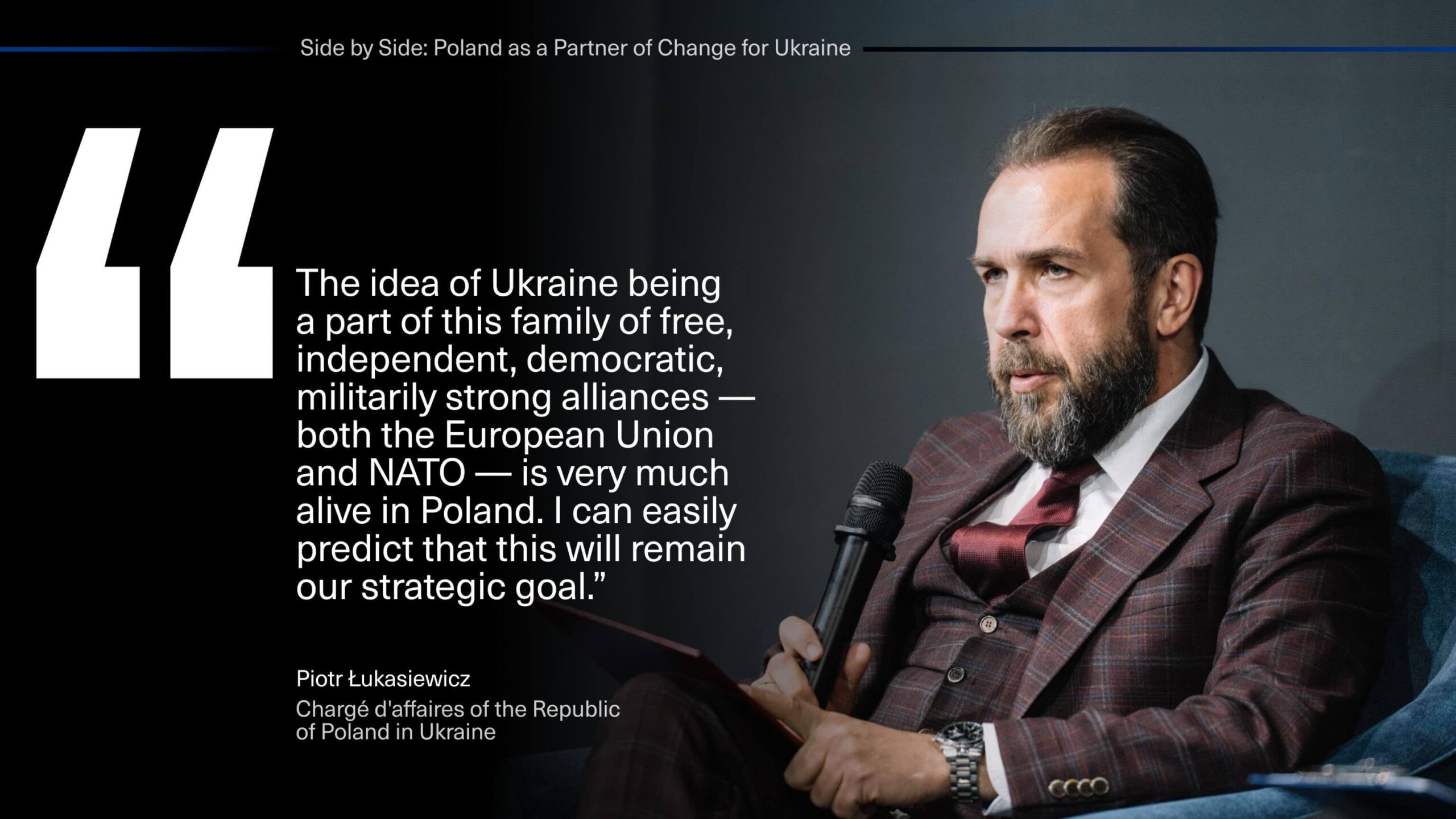
On Poland’s security interest
Mr. Łukasiewicz emphasized that Ukraine’s EU and NATO membership is not only political but also security interest for Poland.
“Strategic choice and interest of Poland that we have Russia as far as possible from our immediate neighborhood. If you are following Polish historical discussions even before the war, it was always our goal to keep Russia as far as possible from Central Europe because its sentiment has not changed for the last 300 years. Russia should not be a part of Central European politics, it should not impose its imperialistic goals on Central Europe. It’s our security interest.”
On the economic issues
Poland sees Ukraine not only as a geopolitical ally but also as a strategic economic partner.
“The European Union is broader than just security – it’s an economic family too, and given the size of our countries Poland has economic interest in Ukraine. In the last 20 years we have been oriented towards the West, especially towards Germany. But I believe, to preserve our economic growth, we should become less a subcontractor of western countries, such as Germany, and look for opportunities in another direction. Economic interest of Poland is having Ukraine as a reliable economic partner since Ukraine has a vast potential in agriculture and many other areas. We have close military, economic and social connections. For example, more than a million Ukrainians became a part of the Polish labour market to the benefit of our country. Despite some toxic discussions around it, Ukrainians are part of our society and economy.”
On the shared vision for the future of Europe
The Ambassador emphasized that Ukraine and Poland can jointly shape the agenda in the European Union and NATO:
“Ukraine and Poland can cooperate in the EU and in other areas. If the current voting system in the EU parliament, an important agency in Europe, remains intact, Poland and Ukraine could create one of the most important voting blocks there. Of course, from time to time our interests would diverge, that is normal. But if we preserve basic unity between us, we would be able to balance other European powers. This is just one example of how we can work together and join hands in the future European organizations or in NATO.”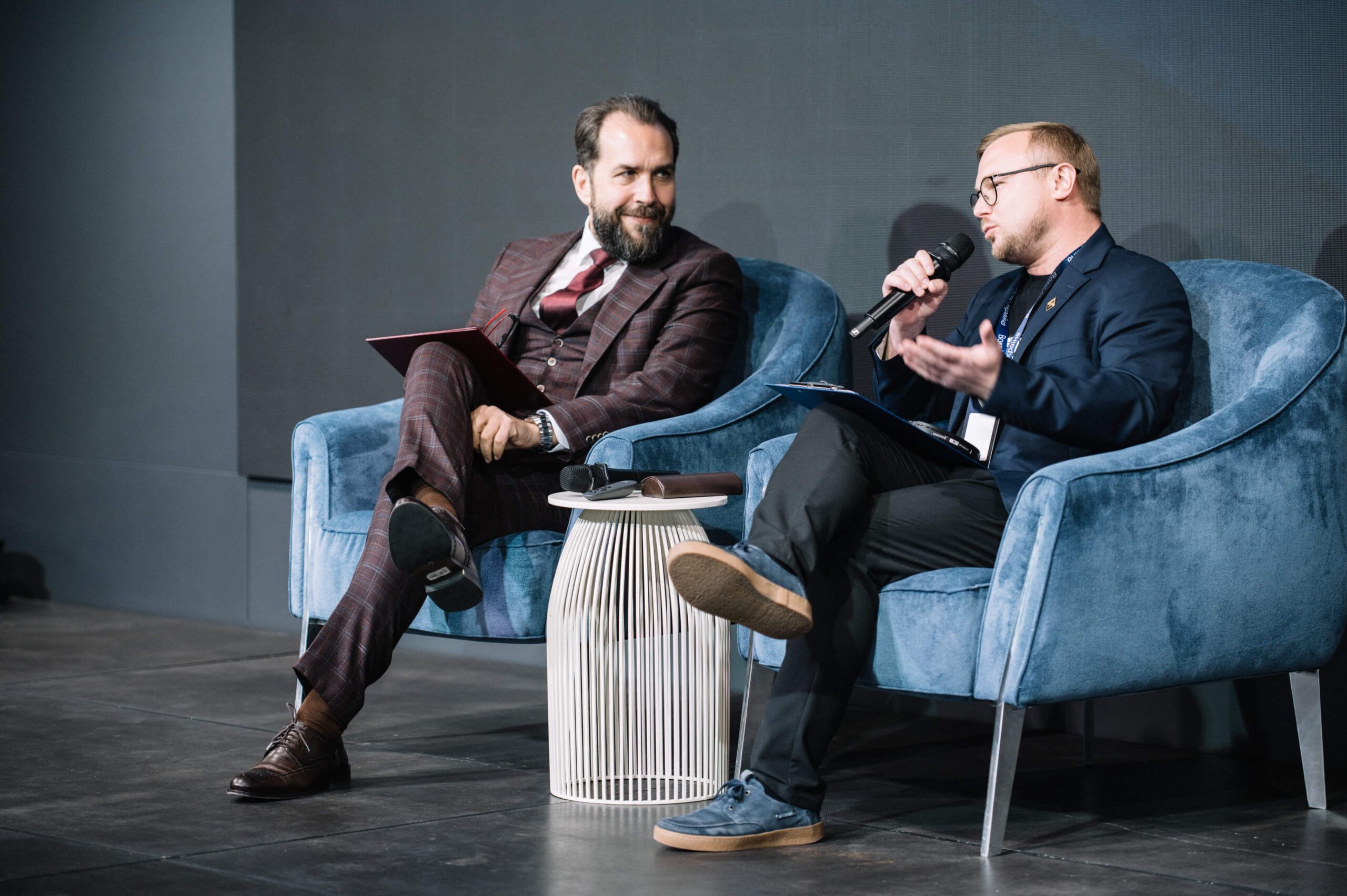
On Polish society, disinformation, and interpersonal relations
In response to a question about the impact of Ukrainian migration on Polish society and public opinion, Piotr Łukasiewicz acknowledged that the topic is complex, especially in view of information attacks and manipulations:
“This is the most difficult issue to discuss, especially in the age of information and disinformation. Social interactions might be used to the benefit of both nations or to spoil their relations. We are fully aware that sometimes emotional discussions might lead to the ruptures between our nations. The task for diplomats — both me here and ambassador Bodnar in Warsaw — is to support these relations and keep communications on such a level that strengthens our relations rather than spoils it. I hope we are doing our job on a satisfactory level.”
“Now we are talking about the transformation of a country that wants to join the European Union and NATO. We, Poles, have been in this position; we saw all the problems and discussions, all the information and disinformation that spreads in the member states of these organizations against potential members. Twenty years ago, when Poland joined NATO and the EU, Europeans were being frightened by Polish plumbers who would come to France and destroy the plumbing market. Similar discussions occurred before the labor market opened for Bulgarians and Romanians, or before the disastrous Brexit. I clearly remember Spanish farmers who revolted against the ‘powerful Polish agricultural sector’ that was coming to destroy the single market. Twenty years have passed, and those discussions have somewhat quieted down. Today, Europe is facing other crises — migration and economic ones. But no one today is talking about Poles stealing jobs from French plumbers or Spanish farmers. So this is a question of how to adapt the market to the challenges associated with the accession of other countries, especially large ones like Poland in 2004 or Ukraine now. It is also a question of proper communication: we need to speak about the untapped potential, not frighten people with mythical threats andа dangers.”
“Today we are talking of the transformation of the nation that is aspiring to join the EU and NATO. We, Poles, have been there. We have seen all the problems, discussions, all the information and disinformation being spread in countries that are part of the organization that is trying to involve future member states. 20-25 years ago when Poland joined NATO and the EU, there were famous warnings in France against Polish plumbers that allegedly would come to France and destroy the plumbing market there. I remember all the discussions that led to the disaster of Brexit in the UK: these were discussions against opening the UK job market for Poles, Bulgarians, Romanians etc. I remember Spanish farmers revolting against the so-called powerful Polish agricultural industry coming and spoiling the common market. Twenty years later this whole discussion has settled down and Europe is undergoing a different kind of crisis – migrant, economic etc., but no one is talking about Poles stealing jobs from French plumbers or Spanish farmers anymore. It is the question of how to adapt the market to the challenges of the new members, especially large ones like Poland then or Ukraine now. But it’s also the question of proper communication – how to utilize the potential rather than highlight imaginary dangers.”
On the benefits of EU membership
“Advantages of European Union membership are immense. Leszek Balcerowicz’s research partner — professor Witold Orlowski — just published a book where he shows with proper economic calculations that Polish wealth grew by almost 300% since 2004. This means that Poland is worth three times what it was worth then. It is good to be part of the EU despite all the accompanying challenges. It also should take good communications from both the EU and future members, like Ukraine.”
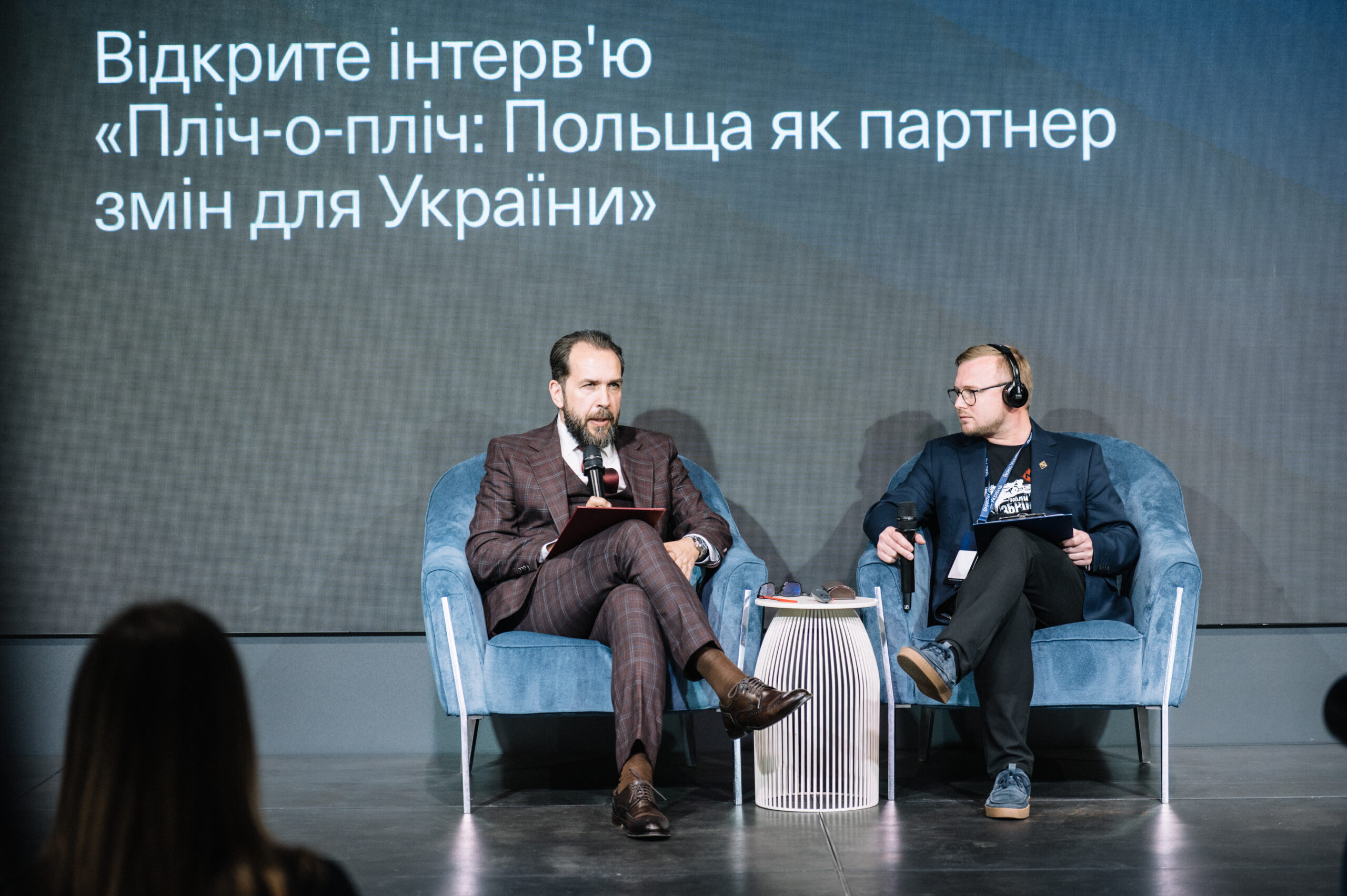
On Poland’s cooperation with Ukraine in reconstruction
Piotr Łukasiewicz emphasized that Poland sees participation in Ukraine’s post-war reconstruction not as as an opportunity for quick gains, but as creation of sustainable cooperation ecosystem between the public and private sectors of both countries:
“Our approach to the idea of reconstruction [of Ukraine] is not just to look for economic opportunities or profitable deals (“hit and run”). Our goal is rather building an ecosystem of public and private sector actors to create something robust and long-term. A state-owned Polish insurer present in Ukraine, a Polish development bank, BGK, just opened its office in Kyiv (this bank will provide loans to local communities for municipal services and it uses Ukraine Facility money). The Polish development agency, Solidarity Fund, designed to support local communities, operates in Ukraine too. I don’t know how many Polish companies are present in Ukraine but three major Polish associations of entrepreneurs work here on the future economic cooperation.”
Mr. Łukasiewicz also noted the importance of supporting veterans:
“We are very interested in Ukrainian veterans, their employment opportunities, and their future place in Ukrainian society. This is one of our “holy tasks” — to support veterans. I am a veteran myself, I know how important it is to actually elevate these people to the proper level after the war ends.”
On the role of Poland for Ukraine
“Poland created a system in Ukraine preparing to utilize its geographical, historical, political, and social closeness to Ukraine. It will be not only a gateway for a major investment from abroad but a part of this investment. We no longer want to play the role of labour force provider in the EU, we would like to take on an investor role in Ukraine. That’s a new role for Poland, and I do my best to live up to these expectations. For us, the gateway to Europe was Germany: the German example was very important for Poland. We are trying to play the same role for Ukraine.
Piotr Łukasiewicz emphasized that Poland has experience of a painful but effective integration with the EU, and is ready to share this knowledge with Ukraine:
“We know the joy and happiness connected with joining the European Union. The process of transformation was very joyful but also quite painful both for Poland and for other countries that adapted themselves to the EU. We are a great source of experience, especially given the size, demography, and economy of Ukraine. That’s why we are sending our experts, for example, to help you write grants applications to the EU.”
On the future
“There is a bright future ahead of both our countries. I genuinely believe that Ukraine will win this war. Russia with all its evil and imperialistic goals would perish as it is now, and Ukraine would emerge victorious in the zones of wealth and security (EU and NATO)”
Photo: Kateryna Lashchykova
Attention
The author doesn`t work for, consult to, own shares in or receive funding from any company or organization that would benefit from this article, and have no relevant affiliations
